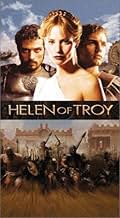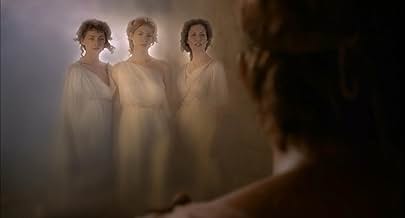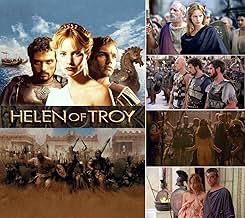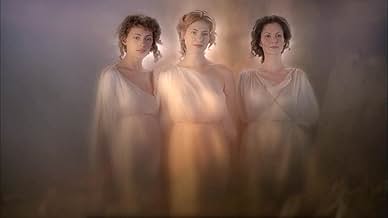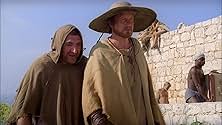Apesar de casada com Menelau, rei de Esparta, Helena apaixona-se perdidamente por Páris, um dos príncipes de Tróia, e foge com ele. A fuga despoleta uma guerra de mais de dez anos entre os t... Ler tudoApesar de casada com Menelau, rei de Esparta, Helena apaixona-se perdidamente por Páris, um dos príncipes de Tróia, e foge com ele. A fuga despoleta uma guerra de mais de dez anos entre os troianos e uma coligação de cidades gregas.Apesar de casada com Menelau, rei de Esparta, Helena apaixona-se perdidamente por Páris, um dos príncipes de Tróia, e foge com ele. A fuga despoleta uma guerra de mais de dez anos entre os troianos e uma coligação de cidades gregas.
- Indicado para 1 Primetime Emmy
- 1 vitória e 7 indicações no total
Explorar episódios
Avaliações em destaque
I disagree with the reviewer who thinks Paris is prettier than Helen. Sienna Guillory is gorgeous! As in the Iliad Paris & Helen are a matched pair. I also disagree with the reviewer who panned the movie because it was not faithful to the Iliad. No movie, not even a TV miniseries, can be expected to be totally faithful to any book. A movie is always a selection. The question should not be what was omitted, or whether it compressed or altered the text for cinematic purposes. Of course it did! The question is whether or not it captured the spirit of the original, or whether it did violence to that spirit, as too many movies do. In my view this movie captured the spirit of the Iliad surprisingly well. Perhaps the Greek heroes, especially Agamemnon, do not come off as heroically as the modern viewer has come to expect. But then our idea of heroism, (confused as it too often is with idealism), is not Homer's; and, then again, this movies portrayal of the Greeks as devious aggressors plotting the conquest of Troy is both historically accurate and does nothing to distort Homer's portrait of them. He certainly would have agreed. I did feel that the movie became somewhat rushed at the end. Unfortunately, this seems to be a common problem with many movies based on classic works of literature. The director seems to lavish most of his energy and resources on the beginning and middle of the story. Then, as time and money begin to run out, the ending becomes hurried, episodes are combined, the story becomes perilously compressed. But even here, the movie does not really leave the viewer disappointed. The scene in which the Trojan Horse suddenly appears without explanation outside the walls of Troy is particularly effective, because it appears to the viewer just as it must have appeared to the Trojans. Even though one may wish for more, nothing in the movie's ending distorts Homer's tale of the fall of Ilium.
DVD borrowed from my local public library, DTS sound, widescreen, each half on each of two disks, I watched it on consecutive nights. I was most drawn to it for Sienna Guillory, young British actress and daughter of a famous musician from Cuba, whom I had seen in the modern remake of 'The Time Machine.' She plays Helen of Sparta, who becomes Helen of Troy, and is the default object of passion which sparks the war and eventual fall of Troy, via the Trojan Horse. Agamemnon and Achilles are depicted as heartless killers with no redeeming qualities. I don't know what Homer had in mind, but this seems to be decidedly different from most earlier treatments of these mythical characters. The video transfer to DVD is very high quality, but the sharpness and realistic colors are not as effective as some period pieces (e.g. Gladiator) which use a mildly tinted image and selective focus to better depict the olden times. Still, for the type of movie it is, a worthwhile depiction of some important Greek mythology.
As a big fan of mythology and the Iliad, I'm pretty surprised by how nitpicky people are being on the details. Having taken a "Mythology in Film" course, I can safely state the following:
1) It's not supposed to be "The Iliad," it's "Helen of Troy." 2) It's a film. Made 3,000 years later. Targeted at an entirely different audience. 3) Greek mythology tends to be greatly inconsistent anyway, depending on your source. 4) Patroklus is never mentioned to justify Achilles's rage against Hector. So what? If Achilles hadn't withdrawn from war, he would've killed Hector anyways. And having him withdrawing and re-entering into the war would only have distracted from the main story (Helen) without really adding anything.
There's a difference between myths and literature. One can stray from the literature of a story while staying true to the mythology of it. The Iliad itself was constantly being reinvented by generations of oral poets who changed the story every time they performed it. Back in ancient times, a person who merely recited the story verbatim would be considered an inferior, because he'd merely be a copycat rather than a storyteller.
When it comes to the spirit and tradition, "Helen" shines. For instance, in the Iliad, Achilles compares Agamemnon taking Brisius to Paris taking Helen. In the film, the comparison is made literal. Brilliant. Then you have themes and scenes taken from the Orestia. Three or four different ideas are brought together in the span of one.
"Helen" may be a bit loose with the details, but it shows a good understanding why those details took place, and stays true to capturing their motivations. Just because they don't follow the material exactly doesn't mean they don't know it really, really well. The same is true for a lot of other film productions, from "Desire Under the Elms" to "O Brother Where Art Thou" to "Medea" and even "Clash of the Titans."
All and all, a good flick, I was pleasantly surprised. My only real complaints was the casting of Achilles (I assume they were combining his character with Ajax/Diomedes) and the fact that Hector never gets to actually beat anyone in combat (That was disappointing, to say the least).
1) It's not supposed to be "The Iliad," it's "Helen of Troy." 2) It's a film. Made 3,000 years later. Targeted at an entirely different audience. 3) Greek mythology tends to be greatly inconsistent anyway, depending on your source. 4) Patroklus is never mentioned to justify Achilles's rage against Hector. So what? If Achilles hadn't withdrawn from war, he would've killed Hector anyways. And having him withdrawing and re-entering into the war would only have distracted from the main story (Helen) without really adding anything.
There's a difference between myths and literature. One can stray from the literature of a story while staying true to the mythology of it. The Iliad itself was constantly being reinvented by generations of oral poets who changed the story every time they performed it. Back in ancient times, a person who merely recited the story verbatim would be considered an inferior, because he'd merely be a copycat rather than a storyteller.
When it comes to the spirit and tradition, "Helen" shines. For instance, in the Iliad, Achilles compares Agamemnon taking Brisius to Paris taking Helen. In the film, the comparison is made literal. Brilliant. Then you have themes and scenes taken from the Orestia. Three or four different ideas are brought together in the span of one.
"Helen" may be a bit loose with the details, but it shows a good understanding why those details took place, and stays true to capturing their motivations. Just because they don't follow the material exactly doesn't mean they don't know it really, really well. The same is true for a lot of other film productions, from "Desire Under the Elms" to "O Brother Where Art Thou" to "Medea" and even "Clash of the Titans."
All and all, a good flick, I was pleasantly surprised. My only real complaints was the casting of Achilles (I assume they were combining his character with Ajax/Diomedes) and the fact that Hector never gets to actually beat anyone in combat (That was disappointing, to say the least).
I can't believe that the writers of this miniseries read any of the myths or the Iliad itself. The inconsistencies were truly amazing. But I guess it didn't matter, as the plot seemed to revolve around fighting and nudity. First of all Cassandra could not have told her father to kill the infant Paris; she did not receive her powers until she was a young woman. Apollo wanted her; she said yes and received the gift of prophecy; then, when she refused him, he could not take it back but cursed her that no one would believe her. Helen was not kidnapped by Theseus! Clytemnestra had three children, and Orestes and Elektra helped her wreak her vengeance for the death of Iphigenia. The gods & goddesses took a much more active part in the war, with Aphrodite telling Paris where to shoot Achilles and Athena guiding Odysseus, her favorite. The arrow in the heel meant nothing without the explanation. Agamemnon took Cassandra as part of his spoils. Hector had a wife, Andromache, whom he adored. Where was she? Where was Ajax?This was just too far from canon. One thing I did like was the loving relationship between Clytemnestra and her daughter Iphigenia; it was very understandable why she would kill Agamemnon.
As for the actors, Helen was not that beautiful. It was good to see John Rhys-Davies, but he was too thin and did not look well. Maryam D'Abo was made to look too old--an older actress should have been cast. She's still a Bond girl to me! Achilles was overplayed, and there was no reason for him to be bald. I did like Odysseus, however.
I'm not really sorry I watched it, just a little ashamed of myself for sticking out the whole four hours.
As for the actors, Helen was not that beautiful. It was good to see John Rhys-Davies, but he was too thin and did not look well. Maryam D'Abo was made to look too old--an older actress should have been cast. She's still a Bond girl to me! Achilles was overplayed, and there was no reason for him to be bald. I did like Odysseus, however.
I'm not really sorry I watched it, just a little ashamed of myself for sticking out the whole four hours.
The Helen of Troy miniseries on USA today failed apparently because the writer lacked the nerve to tell the classic story, and instead made up his own. Instead of using Homer's Illiad as a starting point, the TVsters seemed to turn to the 1956 film as the primary source--turning the seduction/kidnap of Helen into a big ol' love story.
So many key elements were missing: the interventions of the gods, the quarrel between Achilles and Agamemnon, the killing of Patroclus in Achilles armor, Achilles subsequent killing of Hector, etc. This was the storyline of what we know of the myth of the Trojan War.
And major characters are triviliazed or disappeared: Hector's glory on TV is as a second banana to Paris; mighty Ajax gets a mention, little more; Diomedes, Nestor, Idonmoneus are absent. On the Trojan side, Aeneas, Sarpedon, Glaucus, Deiphobus and others are equally invisible.
Agamemnon is seen, not as a hero with the fatal flaw of hubris but a Hitlerian monster. Menaleas, a strong warrior in the Illiad, seems like he attended all the sensitivity training classes avaiable to the Achians, (the Greeks were referred to as "the Ageans" in the series), but wasn't much of a fighter.
But my biggest beef is with the character of Paris (Helen seemed commonplace, but acceptable). Paris was not much of a hero in the Illiad; actually, he was a bit of a feckless bounder. Helen's feelings toward him were decidedly mixed, with lust, pity, and contempt thrown together. Hector upbraided Paris on several occasions for his cowardice and sloth, but then, Paris occasionally entered the fray as an experienced soldier as well.
I sense the writers chickened out of grappling with a different kind of plot, and thereby missed an opportunity. The difficult interplay among the Greek heroes, the complicated moral choices on both sides, the tragic savagery of war, while existing to small degrees in the series, took back seat to a more or less conventional love story.
Too bad. Production values were fair, and some of the elements were there to make something better.
So many key elements were missing: the interventions of the gods, the quarrel between Achilles and Agamemnon, the killing of Patroclus in Achilles armor, Achilles subsequent killing of Hector, etc. This was the storyline of what we know of the myth of the Trojan War.
And major characters are triviliazed or disappeared: Hector's glory on TV is as a second banana to Paris; mighty Ajax gets a mention, little more; Diomedes, Nestor, Idonmoneus are absent. On the Trojan side, Aeneas, Sarpedon, Glaucus, Deiphobus and others are equally invisible.
Agamemnon is seen, not as a hero with the fatal flaw of hubris but a Hitlerian monster. Menaleas, a strong warrior in the Illiad, seems like he attended all the sensitivity training classes avaiable to the Achians, (the Greeks were referred to as "the Ageans" in the series), but wasn't much of a fighter.
But my biggest beef is with the character of Paris (Helen seemed commonplace, but acceptable). Paris was not much of a hero in the Illiad; actually, he was a bit of a feckless bounder. Helen's feelings toward him were decidedly mixed, with lust, pity, and contempt thrown together. Hector upbraided Paris on several occasions for his cowardice and sloth, but then, Paris occasionally entered the fray as an experienced soldier as well.
I sense the writers chickened out of grappling with a different kind of plot, and thereby missed an opportunity. The difficult interplay among the Greek heroes, the complicated moral choices on both sides, the tragic savagery of war, while existing to small degrees in the series, took back seat to a more or less conventional love story.
Too bad. Production values were fair, and some of the elements were there to make something better.
Você sabia?
- CuriosidadesThis adaptation changes several aspects of the original legend of Helen. The gods play almost no role in the characters' lives, Helen is not shown to have any children and it's not explained how Cassandra supposedly got her powers. Instead, the series plays the story like a brutal historical event with little supernatural elements.
- Erros de gravaçãoIt is mentioned three times that Troy is the gateway to the riches of Byzantium. The city of Byzantium was founded in 667BC five centuries after the Trojan War.
- ConexõesReferenced in In Praise of Action (2018)
Principais escolhas
Faça login para avaliar e ver a lista de recomendações personalizadas
- How many seasons does Helen of Troy have?Fornecido pela Alexa
Detalhes
- Data de lançamento
- País de origem
- Central de atendimento oficial
- Idioma
- Também conhecido como
- Helen of Troy
- Locações de filme
- Empresas de produção
- Consulte mais créditos da empresa na IMDbPro
- Tempo de duração
- 1 h 28 min(88 min)
- Cor
- Mixagem de som
- Proporção
- 1.78 : 1
Contribua para esta página
Sugerir uma alteração ou adicionar conteúdo ausente


